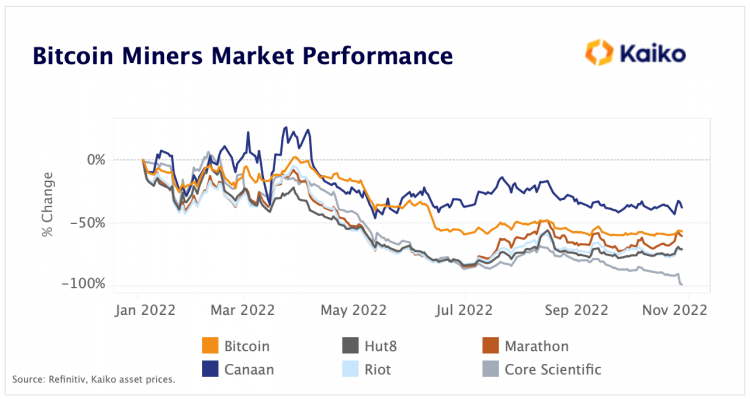Crypto stocks sink in 2022: Are bitcoin miners doomed?

What a difference a couple of months in the market can make. Last year’s darlings, cryptocurrency miners, are now becoming an endangered species – with some declaring risks of bankruptcy.
Last year’s stellar performer, Argo Blockchain (ArgB), revelaed it was struggling with finding (and retaining) investors. This comes just a few days after another publicly-listed miner, Core Scientific (CORZ), filed for bankruptcy with the Securities and Exchange Commission (SEC).
Bitcoin miners’ revenues come from – well, bitcoin – but their share prices haven’t fallen in line with the crypto king – they’ve sunk much deeper. As of 1 November 2022, bitcoin (BTC) is down 56% in 2022, while most major miners are trading some 70%-90% below their value at the beginning of the year. Why? And can the sector recover?
What is your sentiment on ARBgb?
Vote to see Traders sentiment!
Argo Blockchain (ArgB) share price
Failing bitcoin (BTC) price, rising energy prices
At the height of the cryptocurrency market jubilee of 2021, the reward for one mined bitcoin was $69,000. By Q3 2022, the prize was slashed to $20,000. The bitcoin mining business is inherently cyclical, and the bear market was always going to be a period of drought.
But in what has been a perfect storm for the bitcoin miners, this particular bear market has been coupled with skyrocketing energy prices and rising miners’ costs that further squeeze their balance sheets.
“To exacerbate issues, mining companies are turning to native crypto lenders for liquidity despite higher interest rates and stringent collateral requirements,” Dessislava Aubert, research analyst at cryptocurrency market data provider, Kaiko, points out.
Core Scientific share price (CORZ)
Bitcoin (BTC) vs. bitcoin miners’ performance
The sector is now down on average 70% in 2022.
Marathon (MARA), Riot (RIOT), Hut 8 Mining Corp. (HUT), HIVE Blockchain Technologies (HIVE) are down 60%, 70%, 70% and 78% respectively year-to-date.
The embattled Core Scientific, (CORZ) is trading a staggering 98% below its value at the beginning of the year.
Some smaller miners – like BIT mining and Digihost – are even facing delisting from the New York Stock Exchange (NYSE) and Nasdaq due to their share prices falling below the $1 threshold.
 Bitcoin (BTC) is beating most of bitcoin miners. — Kaiko.
Bitcoin (BTC) is beating most of bitcoin miners. — Kaiko.Dire outlook?
Can the sector pick up or will the dire situation continue, potentially leading to a wave of mergers & acquisitions?
According to Kaiko’s Aubert, the sector may be in for more “lean years” and M&A.
“The move towards consolidation of the sector will likely continue as market conditions remain challenging,” she says. “Investors have been slashing their exposure to crypto (and risk assets in general) and these dynamics will remain until global central banks pivot.”
The sector would also be helped energy crisis calming down, as miners need “extremely cheap energy to be profitable”, as bitcoin mining analyst Jaran Melleurd points out.
COIN underperforming BTC
While bitcoin mining has been hit especially hard, other crypto-linked stocks are underperforming bitcoin too.
The cryptocurrency exchange platform, Coinbase (COIN), which listed on Nasdaq to great fanfare last year during a crypto bull run, is now down 73% – twice as much as Robinhood (HOOD) – a trading platform, which has a number of cryptocurrencies but offers trading other assets classes. HOOD is down 37% YTD.
Biggest corporate owner of bitcoin
Meanwhile, MicroStrategy (MSTR), the world’s biggest corporate bitcoin owner, which reported a staggering $1bn loss on its bitcoin stash in August, becoming a target for short-sellers, is outperforming bitcoin slighly.
The US software and business analytics company MicroStrategy has lost lost 52% in 2022 so far.
MSTR’s core business is not tied directly to bitcoin or other cryptocurrencies but it is the world’s biggest corporate owner of bitcoin. The company pledged to stick with increasing its bitcoin holding despite the losses.
Related reading
Rate this article
Comments
There are currently no responses for this story.
Be the first to respond.